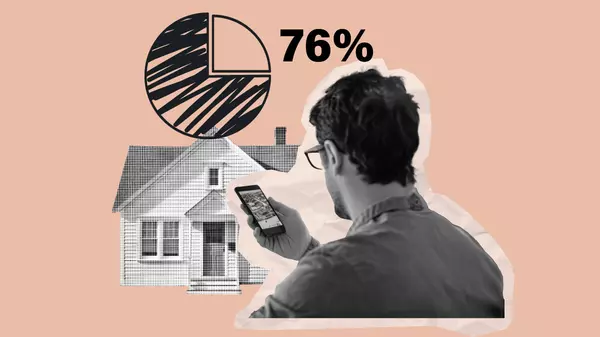

Rate announces revamp of reverse mortgage division with industry veterans
Chicago-based multichannel mortgage lender Rate, formerly known as Guaranteed Rate, has announced a shakeup in its reverse mortgage division’s leadership by appointing two longtime industry veterans to lead the company’s efforts with older borrowers.Jesse Allen, most recently of OneTrust Home Loans and formerly of American Advisors Group (AAG), has been appointed to the role of president for the division. Meanwhile, Greg Pahel — who previously served in other reverse mortgage divisions at different companies, will join alongside as the division’s EVP of consumer direct reverse mortgage lending.Jesse Allen, president of reverse mortgages at Rate." data-image-caption="Jesse Allen" data-medium-file="https://img.chime.me/image/fs/chimeblog/20241121/16/original_8d9c5800-3e88-4450-9708-0be217c9e906.jpg?w=200" data-large-file="https://img.chime.me/image/fs/chimeblog/20241121/16/original_8d9c5800-3e88-4450-9708-0be217c9e906.jpg?w=200" tabindex="0" role="button" src="https://img.chime.me/image/fs/chimeblog/20241121/16/original_8d9c5800-3e88-4450-9708-0be217c9e906.jpg?w=200" alt="Jesse Allen, president of reverse mortgages at Rate." class="wp-image-462029" style="width:200px" srcset="https://img.chime.me/image/fs/chimeblog/20241121/16/original_8d9c5800-3e88-4450-9708-0be217c9e906.jpg 200w, https://img.chime.me/image/fs/chimeblog/20241121/16/original_8d9c5800-3e88-4450-9708-0be217c9e906.jpg?resize=150,150 150w" sizes="(max-width: 200px) 100vw, 200px" />Jesse Allen“Jesse brings a wealth of experience and a remarkable track record of success in the reverse mortgage space,” said Rate CEO Victor Ciardelli. “His leadership aligns perfectly with Rate’s vision of providing innovative solutions that truly meet the needs of homeowners seeking financial flexibility in retirement.”With Allen leading the division and Pahel growing the company’s consumer-direct model, Ciardelli says the lender is “well-positioned to become a leader in this growing market.”The new hires “underscore Rate’s commitment to enhancing financial solutions tailored to the unique needs of this demographic, empowering them to leverage their home equity for a more comfortable and secure retirement,” the company said.Allen maintains roughly 35 years of financial services experience, returning to the reverse mortgage industry in 2016 at its leading lender AAG, after having previously managed Bank of America’s reverse mortgage division before moving to other roles within that company.OneTrust appointed him in 2022 to lead its new 55+ Lending division, where he oversaw its implementation into the OneTrust organization including with reverse mortgage lending.“Rate’s entrepreneurial and innovative culture prioritizes the customer and loan officer at the heart of all operations,” Allen said in a statement. “The company’s extensive reach, core values, and brand credibility offer an incredible platform and opportunity to scale and empower more people to live retirement with greater financial freedom and peace of mind.”Pahel maintains over a decade of reverse mortgage experience including at companies like Nations Direct Mortgage, loanDepot, Primary Residential Mortgage Inc. (PRMI) and The Federal Savings Bank.“I am incredibly excited to embark on this new chapter with Rate,” Pahel said. “Over the next three to five years, I expect to see significant changes in the competitive landscape, with the rankings of the top lenders in the reverse mortgage market up for grabs.”Ryan Ogata has taken on a management position for the company’s forward mortgage arm, HousingWire’s Reverse Mortgage Daily (RMD) has learned.
Read More

10.5 million borrowers at or over age 65 still have forward mortgages
While many older homeowners own their properties free and clear of a mortgage payment, this is not a feasible reality for many seniors. In fact, more than 10.5 million Americans at or over the age of 65 still pay into a forward mortgage loan, according to a study conducted by LendingTree.To get a better grasp of the dynamics involved with older homeowners maintaining their existing mortgages, LendingTree took a closer look at data from the U.S. Census Bureau’s American Community Survey (ACS), which helped illuminate “the share of housing units with mortgages in each of the nation’s 50 largest metros owned and occupied by people 65 and older,” the organization said.Across all 50 examined metro areas, nearly 20% of all homes that had mortgage loans attached to them are owned by someone at least 65 years old. Homes owned by this cohort, the results said, “tend to be less valuable than those owned by the general population, while monthly housing costs tend to be lower.”The metro areas with the largest shares of older homeowners included Las Vegas, Los Angeles and San Diego. More than one-quarter (25.31%) of all homeowners in these regions are at least 65 years old, a figure that drops to 19.76% when averaged across all 50 examined metros.Conversely, the smallest shares of senior-owned homes — 14.64% — were contained within Austin and Dallas, Texas and Salt Lake City, Utah.LendingTree previously examined this statistic in 2021, and the figure has risen by roughly 500,000 people since that point. Other than that, there is relatively minor variation between the data from 2021 and 2024 when comparing the results, however Miami no longer has a higher concentration of senior homeowners and Houston no longer has one of the smallest.While these older homeowners are likely impacted financially by continuing to make forward mortgage payments, their housing costs still tend to be lower than their younger counterparts on average.“Largely because their homes are typically less expensive, median monthly housing costs paid by 65-and-older homeowners with mortgages are usually hundreds of dollars less expensive than median monthly housing costs paid by the general population of homeowners with mortgages,” the results said. “Other factors, such as lower mortgage rates or property tax exemptions, can also help reduce housing costs for older homeowners.”The reverse mortgage industry has consistently expressed frustration with the idea that its penetration rate continues to lag behind the traditional mortgage industry, despite feeling that there is a mismatch between the age of older homeowners and the decades-long terms they may be entering into with a new, forward loan.Reverse mortgage industry trainer and speaker Martin Andelman crystallized this perspective in a 2019 episode of The RMD Podcast.“It’s also worth mentioning that [in terms of] 30-year mortgages, I promise you, no one ever sat around and talked about 30-year mortgages thinking they’d be perfect for 70 and 80-year olds,” he said at the time. “30-year mortgages were never meant to be for them. And now, I bump into people all the time who could be 72 years old, just refinanced two years ago, and now have only 28 years to go. What could go wrong?”
Read More

Credit reports will be at least 20% more expensive in 2025, frustrated mortgage execs say
Executives at mortgage lenders anticipate a minimum 20% increase in credit reporting costs in 2025 compared to 2024. And the soaring costs will hit as lenders try to dig out from multiple years of financial losses and mass layoffs.In early November, Fair Isaac Corp. (FICO), the company behind the widely used consumer credit-risk assessment methodology, announced an increase in its wholesale royalty for mortgage originations from $3.50 to $4.95 per score. However, this is just one among many credit reporting costs for lenders, who must also absorb additional fees from credit bureaus and tri-merge resellers applied downstream. Lenders told HousingWire that they have yet to see price increases from credit providers, as confirmations from the credit bureaus are expected in the coming weeks. However, in planning for 2025, many lenders have already started factoring in higher credit report costs based on initial discussions with vendors.To start, FICO’s wholesale price hike translates to an additional $1.45 per score—equating to $4.35 per borrower and $8.70 per joint application for a tri-bureau credit report, the industry standard.Michael Metz, operations manager at Arizona-based lender V.I.P Mortgage, which has 330 sponsored loan officers across 39 active branches, expects that most credit bureaus will raise their prices as well. “By the time it’s all added in, we’ll see an increase of about $18-20 per borrower,” Metz said. This adds to the current level of $80-$100 for the tri-merge credit report and score bundle, based on FICO’s estimates. “FICO set the stage for the pricing increase with their 40% increase this year. I think we’ll see most credit bureaus take that opportunity to do similar swings.” Metz said. “With pending legislation banning trigger leads, they’ll need to go conservative and make up the revenue – anticipating it passes – and increasing the pricing now to make up for that loss of revenue.”At Tennessee-based First Community Mortgage, which operates with about 200 registered loan officers across 38 active branches, credit reporting costs are projected to increase by 22% in 2025.“Our new pricing starts on January 1, and given our discussions with our vendor, we anticipate the expense to rise by $12 to $20 per report,” said Keith Canter, CEO at First Community Mortgage. “Currently, we pay $82, so for 2025, we are budgeting $100 per report. We should have the exact amount within the next two weeks.” While the year-over-year price increase for 2025 may seem moderate compared to recent years, it represents a significant 72% jump from 2023 for First Community Mortgage.FICO does not set the final price for customers. In 2023, the company implemented a tiered wholesale pricing structure ranging from $0.60 to $2.75 per score, which caused some lenders’ final costs to surge by as much as 400%. In 2024, FICO returned to a fixed royalty of $3.50 per score, applying the same rate for both soft and hard credit pulls. Now that the 2025 wholesale price of $4.95 per score is official, HousingWire contacted the three major credit bureaus—Experian, Equifax, and TransUnion—to inquire about their 2025 pricing policies for mortgage lenders. However, none provided specific details or responded to the request. In a statement provided to HousingWire, a spokesperson for TransUnion said, “Credit reports represent a fraction of a percent of the cost to purchase a home, and ultimately it is an individual mortgage lender’s decision whether to pass those minimal costs onto their customers.We are proud of the role we play helping homebuyers qualify for a mortgage that meets their needs, and are likewise proud to supply consumers with free weekly credit reports to help them plan for their home purchase.” Putting it into perspective Jim Wehmann, executive vice president of scores at FICO, wrote in a recent blog post that the $4.95 royalty per score accounts for a small portion—approximately 15%—of the cost of a tri-merge credit report and score bundle. “With total average closing costs of $6,000, FICO’s share of total average closing costs before this new per-score royalty was only approximately two-tenths of one percent.” However, executives at mortgage lenders view these costs differently. A white paper from the Community Home Lenders Association (CHLA) noted that credit reports are often pulled multiple times during the mortgage application process, as they are only valid for 120 days. Given that home searches can extend over many months, it can swell to hundreds of dollars.According to CHLA, the credit costs for closing a single loan have increased from $50 in 2022 to between $150 and $200 in 2024. When factoring in credit reports for applications that do not lead to closed loans, the cost rises dramatically to $510–$725 per closed loan in 2024. CHLA plans to release a new estimate for 2025 in the coming weeks.“The cost of the credit report may remain a smaller share of the total closing costs on a loan, but a mortgage company still has a loss from the other credit reports pulled that don’t convert into a closed loan,” Metz said. “That ends up having more impact on a mortgage company’s financial performance, which affects consumer pricing in a world with thinned margins.” Phil Crescenzo Jr., a branch manager at New Jersey-based Nation One Mortgage Corporation, which has 52 sponsored loan officers across six active branches, said that overall costs associated with credit reporting at his branch now total $20,000 per month, more than double what they were two years ago.“Part of that is credit rescores and updates, and some verifications – VOE, VOA, VOR items – through the credit report process, not just standard reporting,” Crescenzo said. “At some point, it does fall back on the borrower, or maybe the lender covers some, or they give them credit, but it’s all going to come from somewhere.” The latest data from the Mortgage Bankers Association (MBA) shows that independent mortgage banks (IMBs) as a group saw improved profitability in Q3 2024, with an average pretax net profit of $701 per loan (18 bps). However, 71% of IMBs reported profitability across both their origination and servicing operations—a decline from 78% in the prior quarter, and a 20% increase in credit reporting costs would bring down that 18 bps figure, industry analysts said.The cost to close a loan Canter, from First Community Mortgage, said that rising vendor costs are happening at a time when IMBs are striving to lower the average cost of closing a loan to below $10,000. At his company, credit reporting expenses account for 2% to 3% of the total cost per loan. But it adds to compliance and regulatory burden and irrational margin setting by competition, he said. “In the last two quarters, we have been profitable, thankfully.” Leading U.S. mortgage lenders have taken steps to support originators in navigating the challenging market environment. Detroit-based Rocket Mortgage, for instance, introduced its Fee Freedom initiative in 2023, covering the cost of credit reports for brokers closing loans through its wholesale arm, Rocket Pro TPO. The program was extended into 2024.“Next year, with all the increase, we’re going to have to sit down and look at it,” Rocket Pro TPO‘s executive vice president Mike Fawaz said. “Our decision is to continue to cover credit reports fees for our broker partners, similar to what we did the last two years. Now, we also did tell our broker partners that at one point, we will cover everything when the loan doesn’t close, but if a loan closes, we will charge for that. I don’t know if we’ll implement it next year or not.”For now, Rocket is maintaining the program, as brokers are increasingly hesitant to pull credit reports due to its costs, according to Fawaz. He said this approach is an investment in strengthening Rocket’s broker network.
Read More
Categories
Recent Posts












